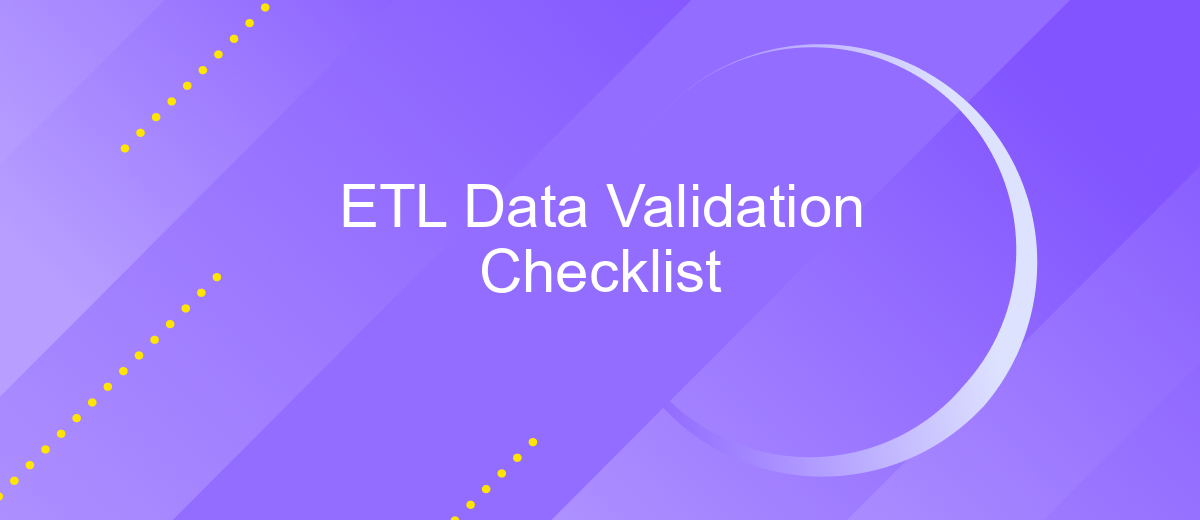ETL Data Validation Checklist
Ensuring the accuracy and reliability of data is crucial in any ETL (Extract, Transform, Load) process. A comprehensive ETL Data Validation Checklist helps in identifying and mitigating potential issues before they impact your data warehouse. This article provides a concise yet thorough checklist to guide you through the essential steps for validating your ETL processes, ensuring data integrity and consistency.
ETL Data Validation Checklist
Ensuring the accuracy and reliability of data in ETL processes is crucial for maintaining data integrity. A comprehensive ETL data validation checklist can help identify and rectify errors early in the data pipeline.
- Verify source data integrity: Ensure the source data is complete and accurate before it enters the ETL pipeline.
- Data type validation: Check that data types match the schema definitions in the target system.
- Null value handling: Identify and manage null values appropriately to prevent data quality issues.
- Consistency checks: Ensure data consistency across different data sources and target systems.
- Range and constraint validation: Verify that data values fall within the expected ranges and constraints.
- Duplicate detection: Identify and handle duplicate records to maintain data uniqueness.
- Transformation accuracy: Validate that data transformations are applied correctly and produce the expected results.
- Integration validation: Use tools like ApiX-Drive to automate and verify the accuracy of data integration between different systems.
Regularly updating and adhering to an ETL data validation checklist can significantly improve the quality and reliability of your data. Leveraging automation tools such as ApiX-Drive can streamline the validation process and ensure seamless data integration.
Introduction

ETL (Extract, Transform, Load) processes are fundamental to modern data management, enabling organizations to consolidate data from various sources into a unified repository for analysis and reporting. However, ensuring the accuracy and integrity of this data is crucial, as any discrepancies can lead to flawed insights and decision-making. A comprehensive ETL data validation checklist is essential for verifying that data is correctly extracted, accurately transformed, and properly loaded into the target system.
Incorporating automated tools and services, such as ApiX-Drive, can significantly streamline the ETL validation process. ApiX-Drive facilitates seamless integration between different data sources and destinations, reducing the risk of errors during data transfer. By leveraging such tools, organizations can implement robust validation checks at each stage of the ETL pipeline, ensuring data quality and consistency. This approach not only enhances the reliability of the data but also saves time and resources, allowing teams to focus on more strategic tasks.
Data Validation Techniques

Data validation is a critical step in the ETL process to ensure that the data being transferred is accurate, consistent, and reliable. Various techniques can be employed to validate data effectively.
- Field Validation: Ensure that each field contains the correct type of data. For example, numeric fields should not contain text.
- Range Checking: Verify that numeric values fall within predefined limits.
- Uniqueness Checks: Confirm that unique fields, such as IDs, do not have duplicates.
- Consistency Checks: Ensure that related data across different tables or sources is consistent.
- Null Checks: Identify and handle null values appropriately, depending on the context.
- Integration Validation: Use services like ApiX-Drive to automate and validate data transfers between various applications and platforms.
By implementing these techniques, organizations can significantly reduce the risk of data errors and ensure that their ETL processes produce high-quality, reliable data. Regular validation and monitoring are essential to maintain data integrity over time.
ETL Data Validation Best Practices

Effective ETL data validation is crucial for ensuring data accuracy and consistency. One of the best practices is to implement automated validation checks at each stage of the ETL process. This includes verifying data formats, checking for missing values, and ensuring data transformations are accurate.
Another essential practice is to maintain a robust logging and monitoring system. This helps in tracking data flow and identifying any discrepancies or errors in real-time. Using tools like ApiX-Drive can streamline this process by providing seamless integration and monitoring capabilities.
- Automate validation checks at each ETL stage
- Implement robust logging and monitoring systems
- Regularly review and update validation rules
- Use integration tools like ApiX-Drive for efficient monitoring
- Conduct periodic audits and data quality assessments
By following these best practices, organizations can significantly improve the reliability and accuracy of their ETL processes. This ensures that the data used for decision-making is both accurate and trustworthy, ultimately leading to better business outcomes.


Conclusion
In conclusion, ensuring the accuracy and reliability of your ETL processes through a comprehensive data validation checklist is crucial for maintaining data integrity and making informed business decisions. This checklist should encompass various stages, including data extraction, transformation, and loading, to identify and rectify any discrepancies or errors that may arise. By systematically verifying data at each step, organizations can significantly reduce the risk of data quality issues and enhance overall operational efficiency.
Furthermore, leveraging integration services like ApiX-Drive can streamline the data validation process by automating data flows and providing real-time monitoring and alerts. ApiX-Drive’s user-friendly platform allows for seamless integration between multiple data sources and destinations, ensuring that data is consistently validated and up-to-date. By incorporating such tools into your ETL workflow, you can achieve a more robust and reliable data management system, ultimately driving better business outcomes and strategic insights.
FAQ
What is ETL Data Validation?
Why is ETL Data Validation important?
What are the common types of data validation checks in ETL processes?
How can automation tools help in ETL Data Validation?
What should be included in an ETL Data Validation checklist?
Do you want to achieve your goals in business, career and life faster and better? Do it with ApiX-Drive – a tool that will remove a significant part of the routine from workflows and free up additional time to achieve your goals. Test the capabilities of Apix-Drive for free – see for yourself the effectiveness of the tool.

